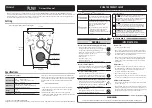
VTI Instruments Corp.
114
EX10xxA Programming
(the diagonal arrow, instead of a horizontal arrow, indicates that the message is not received
instantaneously). As illustrated in this diagram, each instrument driver function call results in two
network messages: one to the EX10xxA (a request) and one from the EX10xxA (a response). The
instrument driver function does not return control to the user application until the response message
is received.
`
Host PC
time
time
Send:
vtex10
xxa_tr
ig_ini
t()
reques
t
Send:
vtex10
xxa_re
ad_fif
o()
reques
t
Send:
vtex10
xxa_re
ad_fif
o()
reques
t
Rece
ive:
vtex
10xx
a_tr
ig_i
nit(
)
resp
onse
Rece
ive:
vtex
10xx
a_re
ad_f
ifo(
)
resp
onse
Rece
ive:
vtex
10xx
a_re
ad_f
ifo(
)
resp
onse
EX1016A
F
IGURE
6-2:
R
EAD
FIFO
N
ETWORK
E
XAMPLE
As can be seen by the vertical distances, each of the instrument driver function calls takes some
finite amount of time, allowing for host PC processing, network transmission and reception, and
instrument processing. For instrument setup (e.g., configuring acquisition channels or trigger
parameters), this time is typically negligible. For retrieving acquisition data, however, these delays
can become significant. This is especially true in high sample count and/or high channel count
systems. In such systems, the host PC can waste a significant amount of CPU time in these polling
loops, also consuming network bandwidth. The streaming data mechanism offers a more efficient
alternative.
Acquisition data is retrieved from the EX10xxA using the
functions. The parameters of these functions control the number of data
scans performed and the allowed time during which data retrieval is attempted. Data returned by
both functions include input channel measurement data and the start time of each scan. The
function also returns CJC channel measurement data and individual
channel timestamp data.
The syntax of this function is complex, and it is important for the user to understand the application
of its various input parameters and return values. Another important concept is that this function is
a blocking function. That is, once it is sent by an application, no further functions can be executed
within that application until the
completed its execution.
Summary of Contents for EX1000A
Page 28: ...VTI Instruments Corp 28 EX10xxA Introduction EX1044 DIAGRAM ...
Page 29: ...www vtiinstruments com EX10xxA Introduction 29 FIGURE 1 5 EX1044 TABLE TOP USAGE ...
Page 34: ......
Page 56: ......
Page 74: ......
Page 130: ......
Page 282: ......
















































